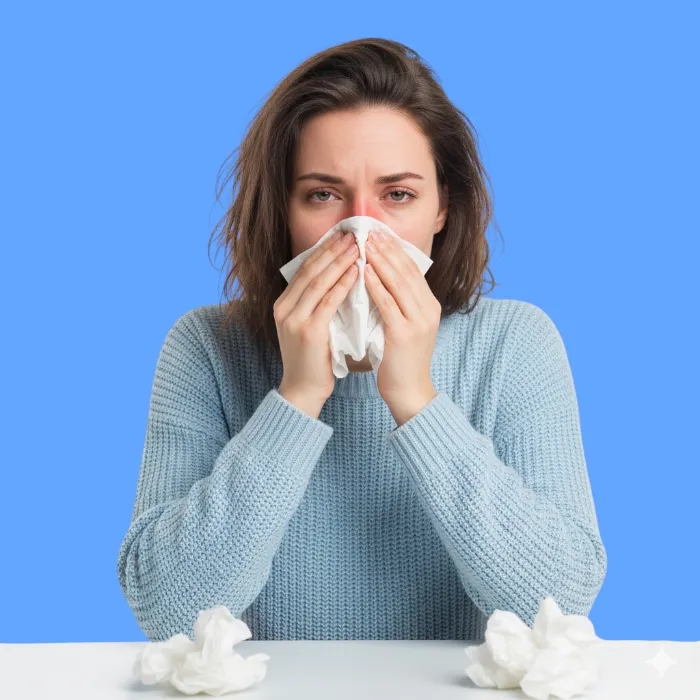What is the common cold?
The common cold is a viral infection that affects the nose and throat, medically known as Common Cold.It is one of the most widespread illnesses, especially during autumn and winter, and affects both adults and children alike.
It usually starts with a mild throat irritation, then develops into a runny or blocked nose, accompanied by sneezing and a light cough Although it is not a serious illness, it is annoying and clearly impacts daily activities.
What are the causes of the common cold?
Cold infections occur when viruses are transmitted from an infected person to a healthy one. Common causes include:
- Rhinovirus: the most common, responsible for around 40% of cases
- Coronavirus: less common but still widespread
- Respiratory Syncytial Virus (RSV): mainly affects children
- Direct contact with an infected person or contaminated surfaces
- Inhaling droplets from sneezing or coughing
- Weak immunity or poor nutrition
- Staying in closed and crowded places
- Sudden weather changes
What are the common symptoms of the cold?

Cold symptoms usually appear one to three days after exposure to the virus and vary in intensity. They include:
- Runny or blocked nose
- Throat irritation or itching
- Frequent sneezing
- Mild cough
- Fatigue or general tiredness
- Mild headache or body aches
- Slight fever
- Yellow or green nasal mucus
When should you see a doctor?
Although the cold usually doesn't require medical treatment, some cases do need a doctor's visit, such as:
- Fever lasting more than 3 days
- Difficulty breathing or wheezing
- Severe throat or sinus pain
- Symptoms worsening after temporary improvement
- Unusual symptoms like ear pain or loss of appetite
- If the patient is an infant or has a chronic illness
- No improvement after 10 days
- Skin rash or facial swelling
What are the treatment methods for the cold?
There is no direct cure for the cold, but symptoms can be relieved and recovery accelerated through several methods, including:
- Full rest and enough sleep
- Drinking plenty of warm fluids
- Using nasal sprays to relieve congestion
- Taking pain relievers like paracetamol or ibuprofen
- Gargling with salt water to ease throat pain
- Using saline drops for the nose
- Taking honey before sleep to reduce coughing
- Using zinc or vitamin C supplements after consulting a doctor
Can the cold be cured?
Yes, the cold is a temporary illness and the body usually recovers on its own within days.Most people recover within 7 to 10 days, although some symptoms like coughing may last longer.
Recovery speed depends on several factors such as immune strength, rest, nutrition, and avoiding irritants.In rare cases, the cold may develop into complications if not managed properly.
What are the prevention tips for the cold?
Preventing the cold involves reducing exposure to viruses. Effective tips include:
- Washing hands regularly with soap and water
- Avoiding touching the face after contact with public surfaces
- Using tissues when sneezing or coughing
- Avoiding crowded places as much as possible
- Strengthening immunity with healthy food
- Avoiding smoking or secondhand smoke
- Ventilating rooms properly
- Not sharing personal items with others
What are the possible complications of the cold?
Although the cold is simple, neglecting it may lead to complications, especially in children or the elderly, such as:
- Sinusitis
- Middle ear infection
- Worsening asthma or allergies
- Severe sore throat
- Chest infections like bronchitis
- Temporary loss of smell or taste
- Secondary bacterial infections
- Chronic fatigue or poor concentration
Common questions about the cold
Is the cold contagious?
Yes, it spreads easily through droplets or touch.
How long does the cold last?
Usually 7 to 10 days.
Does the cold cause fever?
Yes, usually mild.
Can antibiotics treat the cold?
No, it's a viral illness.
Article summary
The common cold is a widespread but annoying illness that affects the upper respiratory tract due to a viral infection ,Its symptoms include runny nose, sore throat, and coughing, and it usually resolves within days without medical intervention.
Personal hygiene and preventive measures play a major role in reducing the risk of infection, especially during cold seasons.